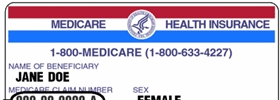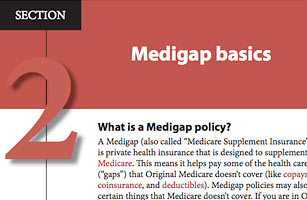 Turning 65 and going on Medicare is one of, if not the, largest insurance transition that most people make in their lifetime. There is a bevy of information “out there” and in your mailbox, and it can all get a little overwhelming if you allow it to. This checklist is composed with that in mind.
Turning 65 and going on Medicare is one of, if not the, largest insurance transition that most people make in their lifetime. There is a bevy of information “out there” and in your mailbox, and it can all get a little overwhelming if you allow it to. This checklist is composed with that in mind.
Going on Medicare Part A
_____ If you are already receiving Social Security, you should receive your Medicare card 2-3 months in advance of the 1st day of the month of your 65th birthday. (If you are not receiving Social Security already, you should sign up for Medicare actively by going online to sign up for Medicare or by calling Social Security at 800.772.1213)
_____ Medicare Part A is automatic and premium-free if you have qualified for it by paying Medicare taxes while working (or if your spouse has).
Going on Medicare Part B
_____ Decide whether you want to enroll in Medicare Part B. Typically, this is based on whether you have insurance through an employer or former employer that would enable you to “delay” Part B.
_____ Do not turn down Medicare Part B unless you are planning to use employer-based insurance instead. There is a hefty penalty for signing up for Part B late (unless you have other creditable coverage).
_____ If you are receiving Social Security already and receive a Medicare card in advance of your 65th birthday, it should show that you are automatically signed up for Medicare Parts A & B. If this is the case, do nothing.
_____ If you are not receiving Social Security already but you want to be enrolled in Medicare Part B, you should sign up for Medicare actively by going online to sign up for Medicare or by calling Social Security at 800.772.1213.
Going on Medicare Secondary Insurance
_____ Understand the differences in Medicare Supplement plans (also called Medigap) and Medicare Advantage. This page may help: Medigap vs. Medicare Advantage.
_____ Compare plan options in an unbiased way. It is advantageous to use an independent agent or broker to assist with this. This does not cost you anything and can help with understanding the plan options.
_____ If choosing a Medigap plan, understand that the coverage, claim payments, and doctor acceptance are all standardized. The primary comparison factors are price and company reputation.
_____ If choosing a Medicare Advantage plan, understand any plan limitations and co-pay obligations, as well as checking to ensure your doctor will accept the plan/is in-network.
Going on Medicare Part D
_____ Decide whether you will take Medicare Part D, which is the part of Medicare that covers prescription drugs.
_____ If choosing not to take Medicare Part D when first eligible, understand the Medicare LEP (Late Enrollment Penalty) that applies to Medicare Part D. This applies if you do not have other creditable drug coverage and opt not to take Medicare Part D when first eligible.
_____ Compare Part D plans. This can be done very easily on Medicare’s website, http://medicare.gov.
_____ Choose a Part D plan that is low in overall annual costs based on your current medication needs, with the understanding that there is an annual election period, during which you can change Part D plans.
If you have questions about going on Medicare or would like a customized comparison of plan options, you can reach us at Secure Medicare Solutions or by calling 877.506.3378.





